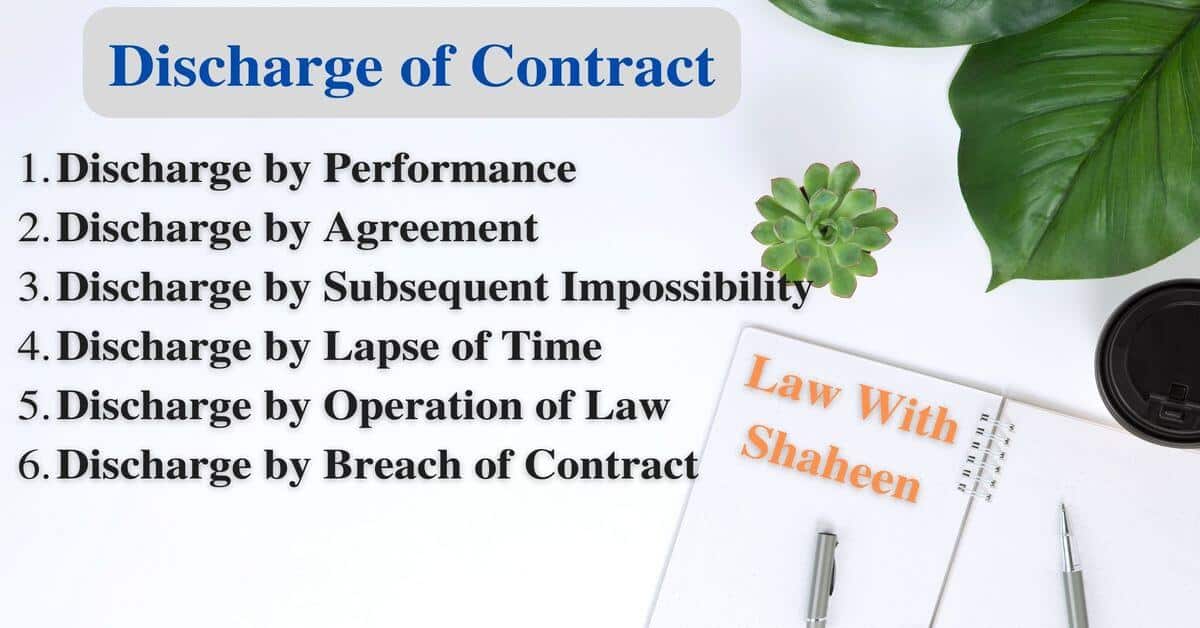In a contract, there are certain rights and obligations on the parties to the contract. When these rights and obligations come to an end, it is known as the discharge of the contract, or the contract is terminated.
Table of Contents
Relevant Provisions:
Section 37, 38, 62, and 63 of the Contract Act, 1872.
Meaning of Discharge of Contract:
Both employers and employees are afforded the right to terminate an employment contract. Some terminations are covered by the law, while others are not.
The process by which an employee may end his or her employment with the employer is called ‘discharge’. Just like any other type of termination, the discharge does not absolve the company of certain obligations to the former employee.
Modes of Discharge of Contract:
There are certain modes of discharge of contract:
- Discharge by Performance
- Discharge by Agreement
- Discharge by Subsequent Impossibility
- Discharge by Lapse of Time
- Discharge by Operation of Law
- Discharge by Breach of Contract
1. Discharge by Performance:
Performance is the natural mode of discharge. When the parties to a contract perform their shares of the promises, the contract is discharged.
If only one of the several parties performs the promise, he alone is discharged. Performance may be in the following ways;
i. Actual Performance:
Under Section 37 of the Contract Act 1872;
When each party to party fulfills the obligations arising under the contract according to the terms and conditions of the contract, it is called actual performance and the contract comes to an end.
For example:
‘A’ is a person who agrees to sell his watch to ‘B’ for another person for $20. ‘A’ delivers the watch and ‘B’ makes the payments. There is actual performance.
ii. Offer of Performance:
Under Section 38 of the Contract Act 1872;
When one of the parties to the contract offers to perform the contract but the other party does not accept it, there is an offer of performance. It is also called tender or attempted performance. It is not an actual performance but is equivalent to it.
Example:
‘A’ agrees to sell his book to ‘B’ for $20. ‘A’ offers to deliver the book but ‘B’ does not accept it. There is an offer of performance.
2. Discharge by Agreement:
A fresh agreement between the same parties can also discharge the contract.
These are the six ways of termination by the agreement:
- Novation
- Alteration
- Rescission
- Remission
- Waiver
- Merger
3. Discharge By Subsequent Impossibility:
If a contract which at the time of formation was not illegal or impossible, afterward becomes illegal or impossible, it becomes void and thus discharged.
Following are different ways in which a contract becomes subsequently illegal or impossible;
- Destruction of subject matter
- Failure of ultimate purpose
- Death or personal incapacity
- Change of law or
- Declaration of war
4. Discharge by Lapse of Time:
A lapse of time is another mode of discharge of a contract.
The Limitation Act 1908 lays down a principle that a contract should be performed at a specific time mentioned in the contract. If there is no specific time, then in a reasonable time.
If a contract is not performed in time and no legal action is taken then the contract is discharged.
Example:
‘A’ owes $20 to ‘B’. After the expiration of the last date of payment, ‘B’ did not file any suit against ‘A’ for three years. ‘B’ losses the right to recover the money back.
5. Discharge by Operation of Law:
By Operation of law, a contract is discharged in the following ways:
- Insolvency
- Merger
- Unauthorized Material Alteration
6. Discharge by Breach of Contract:
Breach of contract is another mode of discharge of contract. A contract must be performed according to its terms, But where the promiser fails to perform the contract according to the terms of the contract there is a breach of contract.
A breach of contract may be of two kinds;
- Actual Breach
- Anticipatory Breach
It is concluded that a contract is discharged when it imposes no further legal responsibilities on the parties either by performance, agreement, impossibility, or even breach.
Frequently Asked Questions (FAQs):
There are six methods of discharge of contract: by performance, by agreement, by subsequent impossibility, by lapse of time, by operation of law, and by breach of contract.
There is a big difference between termination and discharge in contract law. Discharge occurs when the contract is fulfilled or completed, while termination occurs when the contract is ended early.
